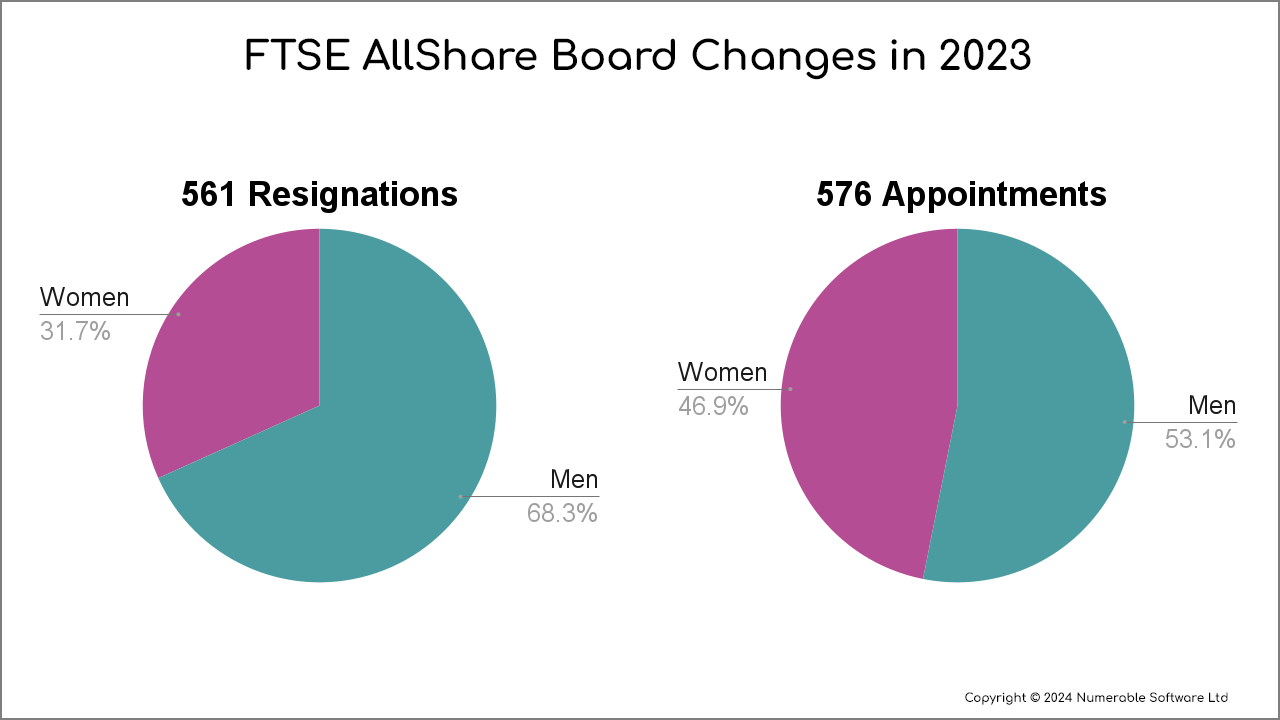FTSE Boards in 2023 – more than twice as many resignations by men than by women
We’ve analysed Numerable’s data on every FTSE board change in 2023.
In the 572 companies that made up the FTSE AllShare Index at the end of the year, there were 561 director resignations and 576 appointments.
More than two thirds of the resignations were by men.
We also checked the compliance, at the end of 2023, of these companies with the 3 Financial Conduct Authority (FCA) board diversity targets. We found that for each target around a third of boards are still non-compliant.
Key Findings
There were 16 fewer companies in the FTSE AllShare index at the end of the year than there were at the start. Compared to the companies in that index at the start of the year, the total number of FTSE directors decreased by about 80.
On 31 December 2023 the FTSE AllShare Index consisted of 572 companies. During 2023, for these companies’ boards:
- The total number of directors increased slightly to 4,246, from 4,231.
- Out of the 576 director appointments, 306 (53.1%) were men and 270 (46.9%) were women.
- More than twice as many men resigned in 2023 than women – of the 561 resignations 383 (68.3%) were by men and just 178 (31.7%) by women. This gender imbalance in resignations contributed to the increase in the proportion of women directors on FTSE boards, from 39.0% at the start of the year to 41.0% at the end.
- Around 20% of appointments were of directors from ethnic minority backgrounds. This can only be an estimate, as the ethnicity of individual directors is not normally disclosed. However it is a sign that recent recruiting behaviour is being influenced by the FCA Listing Rule that each FTSE board should have at least one ethnic minority director.
The large gender imbalance for resignations appears to be mainly due to 2 factors:
- There are more men (59%) than women (41%) FTSE directors, so if they resigned at the same rate there would be more resignations by men than women – but that only accounts for part of the difference in resignations.
- Current male directors, on average, have substantially longer tenure (5.4 years) than female ones (3.6 years). So more male non-executive directors are approaching, or past, the recommended maximum 9 years tenure for independence. This indicates that in coming years men are likely to still be resigning at a higher rate than women, so the proportion of women on FTSE boards will continue to gradually rise.
Board Diversity Targets
There are three board diversity targets in the current FCA Listing Rules – two relating to gender and one to ethnicity. All three of them either had their target increased or were introduced for the first time in 2023.
By the end of 2023 there had been significant progress towards these targets, but a substantial number of companies still missed each target.
| Target | Compliant Boards | Non-Compliant Boards | Not Yet Reported | |
| Proportion of Women Directors | at least 40% of directors to be women | 363 (63.5%) | 209 (36.5%) | na |
| Senior Females | at least one of CEO, CFO, Chair or SID to be a woman | 371 (64.9%) | 201 (35.1%) | na |
| Ethnic Minority Directors | at least one director to be from an ethnic minority | 341 (59.6%) | 166 (29.0%) | 65 (11.4%) |
Numerable identifies all the non-compliant companies, which may be seeking search or advisory services in 2024 in order to become compliant.
____________________________________________________
Numerable is an innovative board intelligence platform with a database of LSE listed public companies, directors, appointments, and associated governance and diversity metrics. It continuously collects and harmonises published information from company registries, annual reports, websites and news releases. It has a range of powerful, interactive tools to browse, search, filter, sort and analyse.

